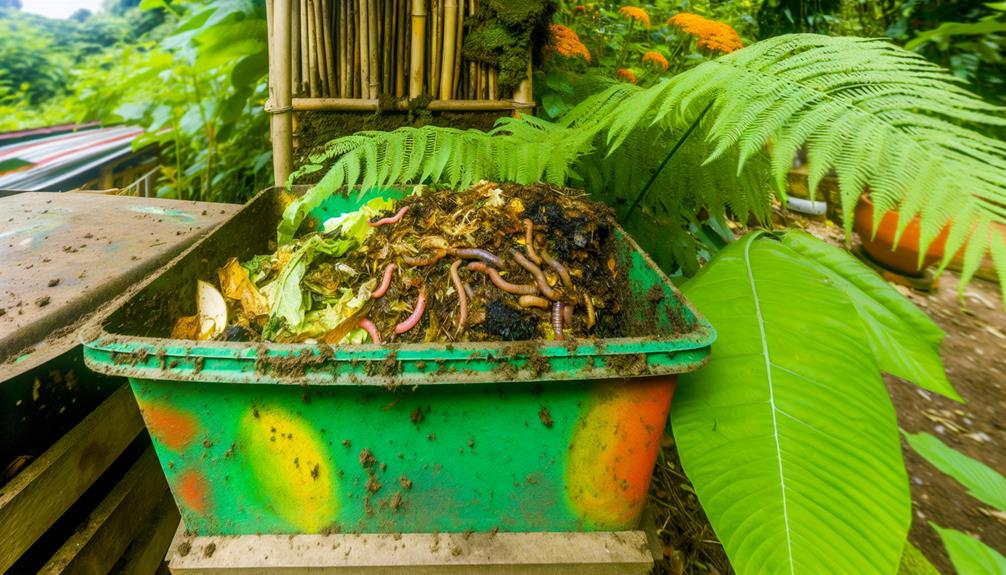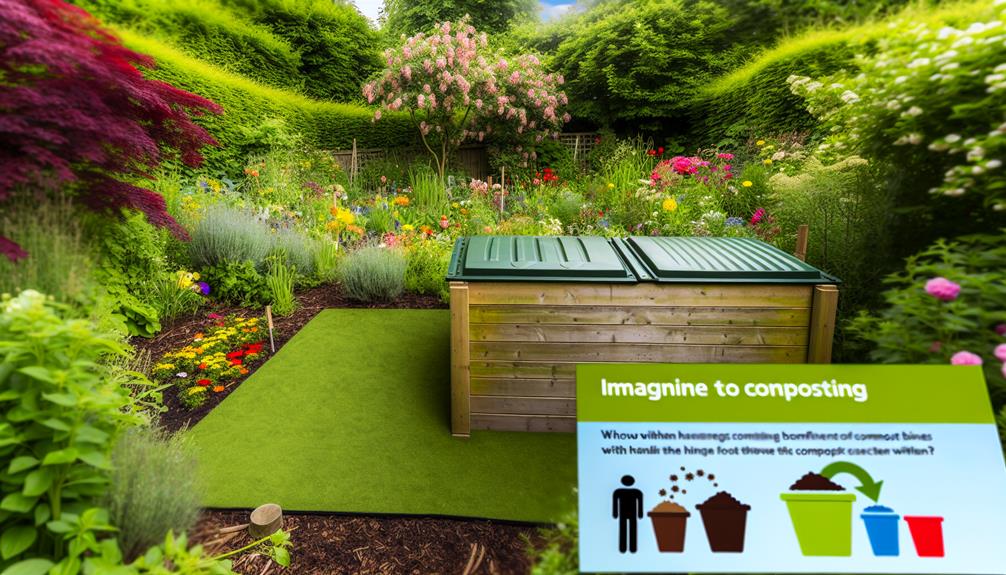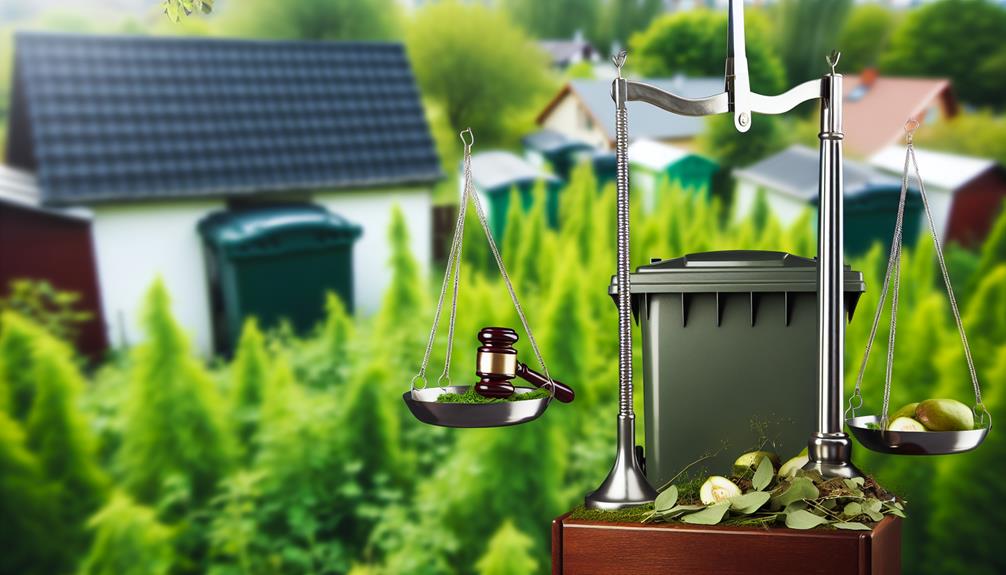

Yes, you can compost certain types of poop safely. Herbivorous pet waste, like that from rabbits and guinea pigs, is nutrient-rich and ideal for compost piles. However, avoid composting carnivorous pet waste, like from dogs and cats, due to harmful pathogens. Farm manure, such as from cows and chickens, is excellent if well-aged or composted first.
Keep compost temperatures above 131°F to kill pathogens, and always handle with gloves. Make sure your compost bin is well-ventilated and away from vegetable gardens. Be aware of local regulations and adhere to best practices for safety and community harmony. Discover which composting methods are best for your needs next.
When it comes to composting poop, it’s important to know which types are safe and effective for your compost pile. Pet waste and farm manure are two common sources you’ll encounter.
However, not all pet waste is created equal for composting purposes. For instance, waste from herbivorous pets like rabbits and guinea pigs can be composted safely. Their droppings are rich in nutrients and break down easily, making them ideal for your compost.
On the other hand, waste from carnivorous pets such as dogs and cats contains harmful pathogens that can contaminate your compost and make it unsafe. It’s best to avoid adding this type of pet waste unless you have a specialized composting system designed to handle it.
Farm manure, in contrast, is a fantastic addition to your compost. Manure from animals like cows, horses, and chickens provides a rich source of nitrogen, which helps break down organic matter. Just make sure the manure is well-aged or composted to kill any harmful bacteria and weed seeds before adding it to your compost pile.
Also Read: Can You Compost Carrot Peel?
Composting poop offers numerous environmental and practical benefits. By transforming waste into valuable compost, you’re not only reducing landfill use but also contributing to soil enrichment. Composting provides a sustainable way to recycle nutrients back into the earth, fostering a healthier ecosystem.
When you compost poop, you’re participating in nutrient recycling. This process helps to return essential elements like nitrogen, phosphorus, and potassium to the soil. These nutrients are important for plant growth, and by recycling them, you’re reducing the need for chemical fertilizers. This natural method supports organic farming and gardening practices, creating a more sustainable food system.
Here’s a quick overview of the benefits:
| Benefit | Description |
|---|---|
| Soil Enrichment | Improves soil structure and fertility. |
| Nutrient Recycling | Returns essential nutrients to soil. |
| Waste Reduction | Decreases landfill waste. |
Additionally, composting poop can improve soil structure by increasing its organic matter content. This leads to better water retention and aeration, which are important for robust plant roots. By incorporating this practice into your routine, you’re joining a community of environmentally conscious individuals committed to sustainable living.
Ensuring safety while composting poop is essential to prevent health risks and environmental contamination.

First, you need to focus on pathogen control. Human and animal waste can carry harmful pathogens like E. coli, salmonella, and parasitic worms. To minimize risks, maintain a compost temperature of at least 131°F (55°C) for several days, which will kill most pathogens. Using a compost thermometer can help you monitor this effectively.
Next, handling precautions are vital. Always wear gloves when handling poop and compost materials to avoid direct contact. Thoroughly wash your hands and any tools used in the process. It’s also wise to keep your composting area away from vegetable gardens and water sources to prevent any accidental contamination.
Proper storage is another key factor. Ensure your compost bin or pile is secure and well-ventilated to reduce odors and discourage pests. A well-maintained compost system not only promotes efficient breakdown but also minimizes health hazards.
Also Read: Can You Compost Cardboard?
There are several effective composting methods you can use to safely and efficiently break down poop. Two of the most popular techniques are hot composting and vermicomposting. Each method has its own set of benefits and requirements, so you’ll need to choose the one that best fits your needs and resources.
Hot composting involves maintaining a high temperature to kill pathogens and break down organic matter quickly. You’ll need a dedicated compost bin, a mix of green and brown materials, and regular turning to keep the pile aerated. It’s a bit more labor-intensive but results in compost within a few months.
Vermicomposting, on the other hand, uses worms to decompose organic matter. This method is excellent for those with limited space. You’ll need a worm bin, bedding material, and specific types of worms, like red wigglers. The process is slower but produces high-quality compost.
Here’s a quick comparison:
| Method | Time to Compost | Space Requirement |
|---|---|---|
| Hot Composting | 2-3 months | Larger area |
| Vermicomposting | 6-12 months | Smaller space |
| Effort Required | High | Moderate |
| Equipment | Compost bin | Worm bin |
Choose the method that aligns with your lifestyle and composting goals.
Also Read: Can You Compost Cat Feces?
Understanding the legal and ethical landscape of composting poop requires grasping local regulations and community norms. You’ll first need to investigate the regulatory frameworks in your area. Many places have specific rules about handling human waste to guarantee public health and environmental safety. Contact your local health department or environmental agency to get the details.

Community perception is equally important. Even if the law allows composting poop, your neighbors might have strong opinions about it. It’s crucial to discuss your plans with them to avoid conflicts and build community support. Explain the benefits and safety measures you’ll implement.
Ethically, composting human waste demands strict adherence to best practices. You’ve got to make sure that your composting system thoroughly processes the waste to eliminate pathogens. Failure to do so could pose health risks to yourself and others. Use a reliable method, like a thermophilic composting system, which uses high temperatures to kill harmful organisms.
By composting poop, you’ll contribute to waste reduction and lessen your environmental impact. This eco-friendly practice helps you join a community committed to sustainability, making a positive difference together for our planet’s future.
You’re wondering about decomposition time. Poop can take anywhere from six months to two years to reach compost maturity, depending on conditions. Joining a community of composters can give you tips to speed up the process.
You should mix carbon sources like straw, leaves, or sawdust with poop to maintain a proper nitrogen balance. This guarantees the compost breaks down efficiently, creating a healthy, sustainable environment for everyone in your community.
Yes, composting poop can produce odors, but if you prioritize odor management and promote aerobic decomposition, you’ll minimize the smell. Use carbon-rich materials and turn the pile regularly to keep your compost community happy.
You can use composted poop for most plants if done correctly. Ensuring high nutrient content and proper pathogen reduction makes it safe and beneficial. Join the eco-friendly community by turning waste into valuable plant food!
Composting poop can be beneficial for your garden, but you must follow specific guidelines to guarantee safety and effectiveness. Choose appropriate types of poop, like from herbivores, and avoid pet or human waste unless properly treated.
Always monitor your compost pile’s temperature and moisture levels. Be aware of local regulations and ethical considerations. By adhering to these practices, you’ll create nutrient-rich compost that’s safe and environmentally friendly.
Remember, proper management is key to successful composting.
